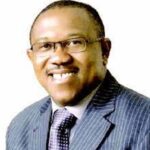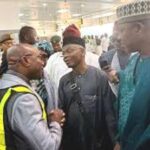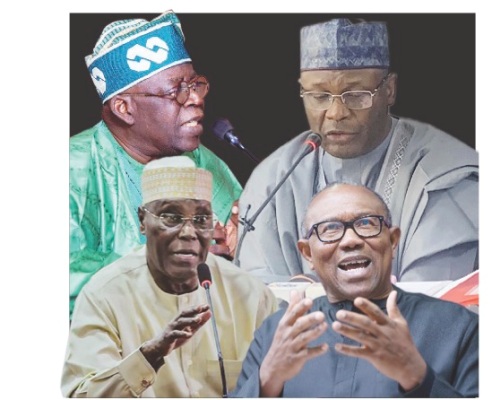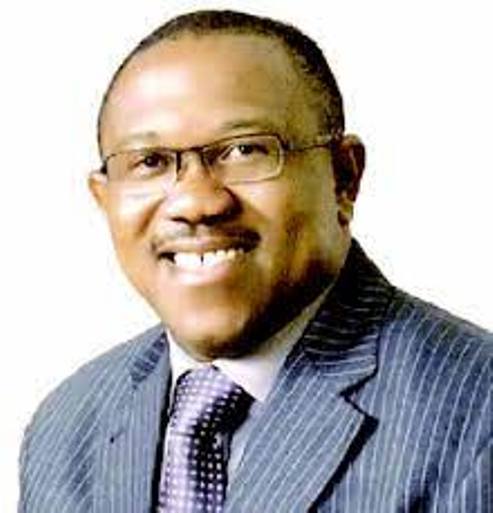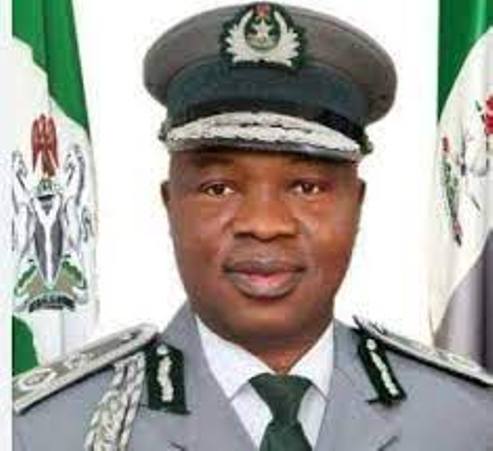LAGOS MARCH 12TH (NEWSRANGERS)-After an intense political subterfuge and disputation that followed the declaration of the results of the Presidential and National Assembly elections held on February 25, all is now set for the anticipated legal fireworks between the President-elect, Bola Ahmed Tinubu and the candidates of the main opposition Peoples Democratic Party (PDP), Alhaji Atiku Abubakar, on one hand, and the standard bearer of the Labour Party (LP), Mr Peter Obi, on the other hand. The two latter contenders are dissatisfied with the results of the Independent National Electoral Commission (INEC) and have resolved to seek appropriate redress in the court.
Tinubu, the candidate of the ruling All Progressives Congress (APC), Atiku, Obi, and Senator Rabiu Musa Kwankwaso of the New Nigeria People Party (NNPP) were the four leading frontrunners in the election contested by 18 political parties.
According to the results declared by the Chairman of the electoral body, Prof Mahmood Yakubu, who also doubles as the Chief Returning Officer, the three leading candidates won 12 states each, while Kwankwaso won only one, Kano State.
On overall, Tinubu polled 8,794,726 scoring 25 per cent of votes cast in 30 states, far and above the 24 states required by the constitution, while Atiku, his closest challenger, garnered 6,984,520 votes, 1.8 million votes lower than the winner’s. Obi and Kwankwaso recorded a total of 6,101,533 and 1,496,687 votes to emerge as third and fourth runners-up respectively.
The distribution of the voting pattern showed that Tinubu won the elections in Rivers, Borno, Jigawa, Zamfara, Benue, Kogi, Kwara, Niger, Osun, Ekiti, Ondo, Oyo, and Ogun states, but lost in his traditional home base in Lagos.
Atiku, on the other hand, won in Katsina, Kebbi, Sokoto, Kaduna, Gombe, Yobe, Bauchi, Adamawa and Taraba states. He equally won in Osun, Akwa Ibom, and Bayelsa states.
While Obi won in Edo, Cross River, Delta, Lagos, Plateau, Imo, Ebonyi, Nasarawa, Anambra, Abia and Enugu states, including the Federal Capital Territory (FCT), Abuja.
However, since the declaration of Tinubu as the President-elect along with his running mate, Senator Kashim Shettima, as the Vice President-elect, tongues have been wagging over the transparency of the process. The opposition parties, notably PDP and LP, are aggrieved that INEC did not follow its guidelines to transmit results obtained from the BVAS directly from the polling units to the IRev server real-time, thus creating room for allegations and counter-allegations of manipulation among the state gladiators.
In readiness for the legal firecrackers, the three parties in contention have already constituted their respective legal teams, which have commenced preliminary proceedings at the tribunal in Abuja.
On Wednesday, Obi was at the Court of Appeal, Abuja, seeking to vary the order of the court permitting him and his Peoples Democratic Party (PDP) counterpart, Atiku Abubakar to inspect election materials used for the conduct of the February 25 presidential election.
Obi came in the company of his party Chairman, Julius Abure, and a former Chairman of the All Progressives Grand Alliance (APGA), Chief Victor Umeh, now a Senator-elect under the platform of the Labour Party.
His appearance at the Appeal Court followed the alleged refusal by the INEC to comply with an earlier order of the court granting his lawyers access to the election materials. The move was to pre-empt any possible alteration that might arise from the planned reconfiguration of the Bimodal Voter Accreditation System (BVAS) used by the INEC for the conduct of the presidential and parliamentary elections. According to the electoral umpire, the reconfiguration is to enable it to deploy the BVAS for the forthcoming governorship and state houses of assembly polls.
As the battle to upturn the victory of Tinubu is about to commence in earnest at the Presidential and National Assembly Election Petition Tribunal sitting in Abuja, two major issues are going to dominate the arguments of the legal teams constituted by the parties involved in the court. One is the issue of whether or not the INEC’s delay in transmitting election results electronically directly from the polling units to the central server has substantially affected the outcome of the polls. And two, the interpretation of the constitutional requirement which stipulates that a candidate to be declared the winner of the presidential election must secure 25 per cent in 2/3 of 36 states of the federation and the Federal Capital Territory. Before the declaration of the overall winner of the election, the results collated by the INEC showed that Tinubu had secured the constitutional requirement of 25 per cent vote cast in 30 states, excluding Abuja.
However, some legal experts have insisted that it is mandatory for any emerging winner to secure a 25 per cent vote cast in Abuja to meet the constitutional requirement, arguing on the basis of the special status assigned to Abuja as against other states.
With APC’s formidable 12-member defence team, wholly Senior Advocates of Nigeria (SANs), which is battle ready to tackle Atiku and Obi’s prosecution counsels also made up of 19 and 13 Senior Advocates of Nigeria (SANs) respectively, the scenario ahead promises to be an interesting boxing bout, so to say.
A Human Rights lawyer, Mike Ozekhome (SAN), while reacting to the raging debate on the Abuja status, berated the INEC for declaring Tinubu as president-elect, noting that he did not get 25 per cent of votes cast in the Federal Capital Territory.
He argued that the relevant provision in the Nigerian constitution states that anybody who must be declared as the winner of a presidential election must get 25 per cent of votes cast in the FCT in addition to 25 per cent of votes in at least 24 states of the federation.
According to him, even if Tinubu got the required 25 per cent of votes cast in more than 24 states of the federation, since he did not get 25 per cent of votes cast in the FCT, INEC should not have declared him as the winner of the election.
“It is clear from the provisions of the constitution that the winner of the presidential election must not only win the plurality of the votes, that is, the most numbers of votes, he must also win 25 per cent in 24 states and the Federal capital territory. Asiwaju Bola Ahmed Tinubu did not score 25 per cent in FCT, even if he scored in 24 states without the mandatory 25 per cent in FCT, he should not have been declared president-elect as INEC wrongly did. So, all these are matters that must and will be challenged at the tribunals,” Ozekhome said.
However, Prof Itse Sagay, a renowned legal luminary, in a telephone chat with Sunday Sun on the matter, dismissed the argument as ridiculous, unnecessary, and unfounded. Hear him: “I think that is laughable. What is the significance of Abuja that any candidate has to score 25 per cent before he can win the presidency? That is ridiculous. As far as the Constitution is concerned, Abuja is regarded as a state. And to that extent, the argument has no merit at all. Why should winning 25 per cent in Abuja be more important than winning 25 per cent in Kebbi or Lagos? That is a ridiculous interpretation of the Constitution,”
He also punctured the argument of those accusing the INEC of breaching its own guidelines by not transmitting results electronically to the server and, therefore, calling for the outright cancellation of the results of the presidential election, dismissing it “as a technical argument that has nothing to do with substance.”
His words: “I don’t think the issue of delay in transmitting results to the central server should affect the results of the election at all, because in the first place, the results that were later uploaded are still same as the ones recorded manually at the polling units. The purpose of uploading to the server is to allow people access to the figures scored by the candidates. I think those who are challenging the result should challenge it on the basis that the results are false if they think so. If there is no difference between what was recorded at the polling units and the ones sent to the server, then they have no case because simply delaying posting it electronically has no basis.
“What the law requires is substantial compliance with the Electoral Act. In this case, uploading results is not a substance non-compliance as to affect the outcome of the election. So, I don’t see any party relying on that getting anywhere at all. That is a technical argument; it has nothing to do with substance.”
Similarly, another Human Rights Activist and Constitutional lawyer, Dr Tunji Abayomi, also lending credence to Sagay’s presupposition, argued that there is nothing in the Electoral Act that requires INEC to transmit results directly to any server.
He argued: “What the Electoral Act requires is that we should vote, the vote should be counted, authenticated with the signatures of the electoral officer and a copy given to the party agents. Once that has been done, the votes counted remain valid in law. The fact that results were not transmitted to the server does not invalidate the vote cast in a polling unit that has met all the conditions set out.
“The problem is that we tend to exaggerate trivialities in an attempt to defeat a valuable procedure in which we have not succeeded. First and foremost, a guideline is not a law. It is a matter of discretion invested in INEC. For example, INEC can issue a guideline today and change it tomorrow. A guideline is an operational strategy within the prerogative of the INEC. It is neither a contract nor a law that is immutable or bidding. A guideline can be changed at any time. What INEC cannot do it to violate a law in the Electoral Act. And there is nothing like the transmission of results to any screen in the Electoral Act.
“The issue of Abuja has been settled long ago in several cases. You don’t need to go very far to understand what the other guys are saying about candidates scoring 25 per cent in Abuja is nonsensical.
“The Constitution makes it clear from the beginning that the Federal Capital Territory is like a state, not a city. That is why it has its own minister. If you add FCT to 36 states, the judgment will be on 37. What this means is that if you have 2/3 in 23 states and the FCT, your 24-state requirement has already been fulfilled. In other words, FCT would be counted as a state.
“You will notice that all the people propounding this crazy strange theory are all people who are lawyers either to PDP or Labour Party. They are looking for straw to hold on to. You don’t need a strong legal mind to appreciate the interpretation of the law on this issue of Abuja.”
Sun News Online

